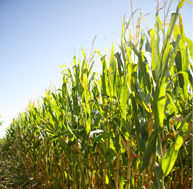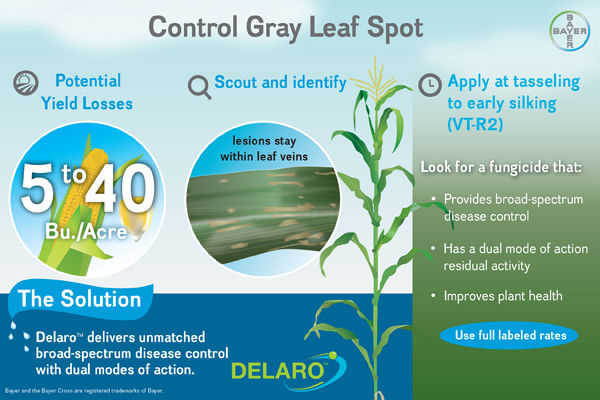Gray Leaf Spot: Corn Farmers' Biggest Rival
January 31, 2018
As every veteran corn producer knows, corn is susceptible to a myriad of foliar fungal diseases. The most aggressive of these diseases, gray leaf spot, has been increasing in economic impact in many regions of the world over the past 10 years.
Because gray leaf spot reduces a plant’s photosynthetic surface area, the fungus significantly diminishes both the yield and quality of the crop. Field trials have shown potential yield losses from gray leaf spot range from 5 to 40 bu/A; however, losses as high as 100 percent are documented when early blighting of the leaves above the ear leaf occurs.
When early blighting of the leaves above the ear leaf occurs due to gray leaf spot, yield losses as high as 100 percent have been documented.
Growing Prevalence and Risk
As reduced tillage became widespread in the 1980s and ’90s, gray leaf spot disease grew commonplace in the heart of the Corn Belt. Farmers eager to capitalize on the increasing value and demand for corn augmented the amount of Midwest acreage in continuous corn. Both trends have contributed to an increase in the amount of corn residue in fields—a circumstance that can lead to severe infections the following year.
The planting of susceptible hybrids and weather conditions that favor rapid spread of the disease have contributed to the fact that gray leaf spot is now endemic in many regions of the world. Future yield losses will correlate with environmental conditions and the overwintering of the fungus in crop residue. If the humidity and frequency of heavy rainfall forecasted for many regions of the U.S. materializes, pathogens are expected to become even more problematic.

If the humidity and frequency of heavy rainfall forecasted for many regions of the U.S. materializes, pathogens that contribute to diseases like gray leaf spot are expected to become even more problematic.
Destroy the Fungi, Save the Corn
Minimizing loss to gray leaf spot disease requires a season-long management plan that incorporates a combination of residue management and variety tolerance. In-season disease management options such as fungicides can also lessen the economic blow of gray leaf spot.
Prolonged warm weather and high humidity provide favorable conditions for the development of the tiny lesions enveloped by yellow halos. As the disease grows, these small lesions expand into the disease’s namesake—large gray spots.
Delaro® fungicide offers preventative and curative defense against yield-robbing diseases, including gray leaf spot, northern corn leaf blight, anthracnose leaf blight and southern rust. This versatile fungicide has application flexibility — at-tassel timing (VT to R2), in combination with a herbicide (V4 to V7) and/or in between (V8 to VT). Delaro can be applied by air, ground or by chemigation and can be mixed with adjuvants, herbicides, insecticides and micronutrients.
Before applying any fungicide, please read the entire label for the best possible results and to confirm that the product is effective on the disease you need to control. Not every product is suitable for every situation, and correct application technique will ensure the best results.
With the relatively high price of corn and the odds of disease prevalence and risk increasing, farmers should consider protecting their crops and their profits from gray leaf spot with a well-timed fungicide application. Additionally, the Crop Science product pipeline offers growers an interesting look at the future of farming and ways in which Bayer researchers are working to strengthen crops against a range of environmental stresses.

Contact your local Crop Science US representative to learn more about Crop Science fungicides.
Sources:
- Wise, Kiersten, and Daren Mueller. "Are Fungicides No Longer Just For Fungi? An Analysis of Foliar Fungicide Use in Corn." APSnet 2011: 1. Web. 14 Aug 2011. www.apsnet.org.
- Wise, Kiersten. "Gray Leaf Spot on Corn." Ag Professional 18, July 2011: 1. Web. 11 Aug 2011. www.agprofessional.com.
- "Gray Leaf Spot in Corn Increases in Iowa." Iowa State University College of Agriculture. Iowa State University College of Agriculture, 08 May 2000. Web. 10 Aug 2011. www.ag.iastate.edu.
- Rees, Jennifer, and Tamra Jackson. "Extension Publications." University of Nebraska-Lincoln. The Board of Regents of the University of Nebraska, December 2008. Web. 12 Aug 2011. www.ianrpubs.unl.edu.
- Lipps, Patrick, and Dennis Mills. "Gray Leaf Spot on Corn." The Ohio State University Extension Fact Sheet. Ohio State University Extension, 2001. Web. 14 Aug 2011. ohioline.osu.edu.
Disclaimer
Always read and follow pesticide label directions, insect resistance management requirements (where applicable), and grain marketing and all other stewardship practices.